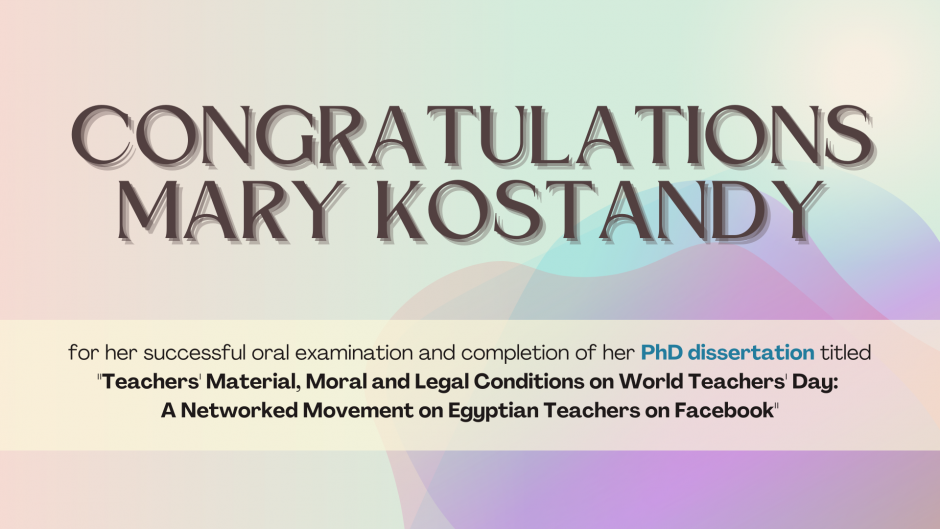Please join us in congratulating Mary Kostandy for her successful oral examination and completion of her PhD dissertation entitled “Teachers’ Material, Moral and Legal Conditions on World Teachers’ Day: A Networked Movement on Egyptian Teachers on Facebook”.
Thank you to Anne Phelan (EDCP; Chair of Examination Committee), the External Examiner (Ann Lopez, OISE/UT), and University Examiners Samia Khan (EDCP) and Handel Wright. Thank you, too, to Supervisory Committee Members, Hartej Gill,Shauna Butterwick, and André Mazawi.

Abstract:
In Egypt, teachers have very little official space to voice their views about their labour conditions given the tightly controlled state-affiliated teachers’ union. To circumvent this, teachers have turned to Facebook rendering digital activism as a distinctive channel in expressing their critique of their working conditions. This study shows that Facebook has become pivotal space for Egyptian teachers forming a networked social movement. Numerous Facebook groups have been created by Egyptian teachers, with memberships ranging from thousands to more than half a million. Male and female teachers from across Egypt’s 27 governorates participate in these digital groups. This study delves into the postings of Egyptian public school teachers during the 2019 World Teachers’ Day, on one of the most active public teacher Facebook groups. It reveals deep insights into their perspective on the struggles and injustices they face, and how those struggles impact them, their families, and the conditions of their profession. A prevalent sentiment was a demand for ending the injustices they face and pleas and prayers to God to lift their oppression. Given teachers’ emphasis on justice, a social justice framework was used as an analytical tool to understand the teachers’ claims about their work. In the theory chapter, justice is explored as a contextual concept, shedding light on local understandings of justice, including Ancient Egyptian, Arab, Muslim, and Coptic. Relevant Western notions of justice, in particular Fraser’s (2005) three-pronged approach to social justice are also considered. The findings prioritize teachers’ vantage points on injustices in an attempt to unearth their understanding of justice. A directed qualitative content analysis approach was used to analyze teachers’ Facebook posts about their work (with a total of 51 posts and 1642 comments). The demographics for a sample of the dataset is provided in order to get a picture of who is participating in these discussions. Teachers’ calls for material, moral and legal justice are the focus of the findings chapter which analyzes teachers’ perspectives on their work conditions in each of those domains. Building on the literature and findings, a “pyramid of justice” was created as a framework to understand the content of justice, the who of justice (to whom one makes claims for justice) as well as the hope for justice (the extent to which a person has belief or hope for change). The conclusion points to how teachers’ calls for justice are in line with the Egyptian citizens calls during the 2011 uprisings, namely “bread, freedom and human dignity.”